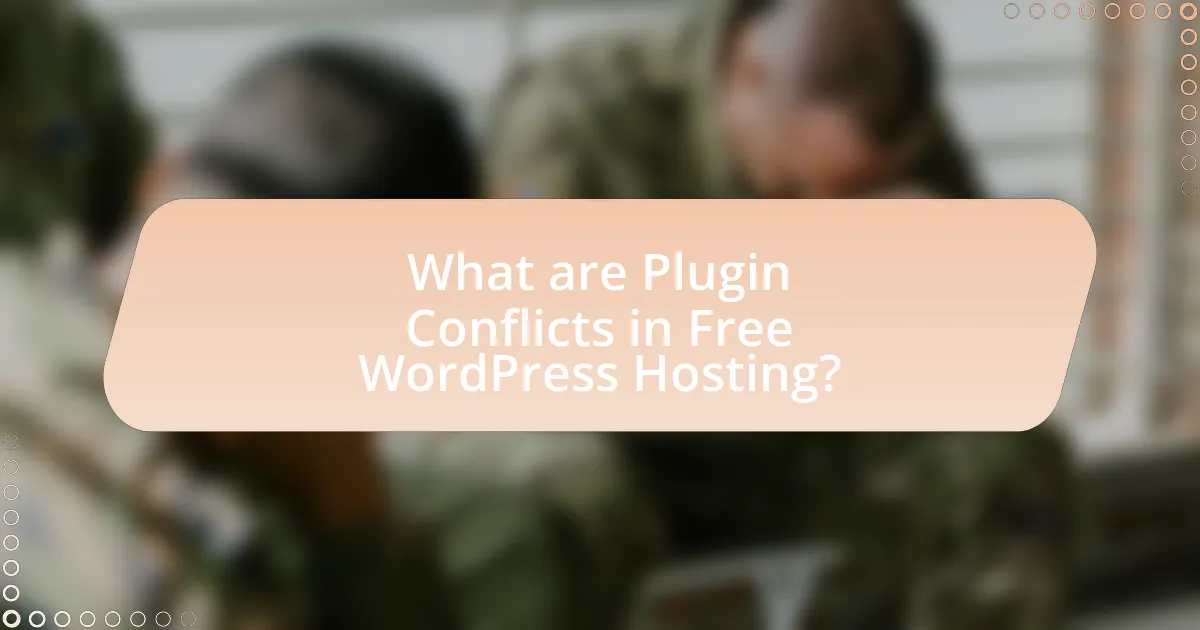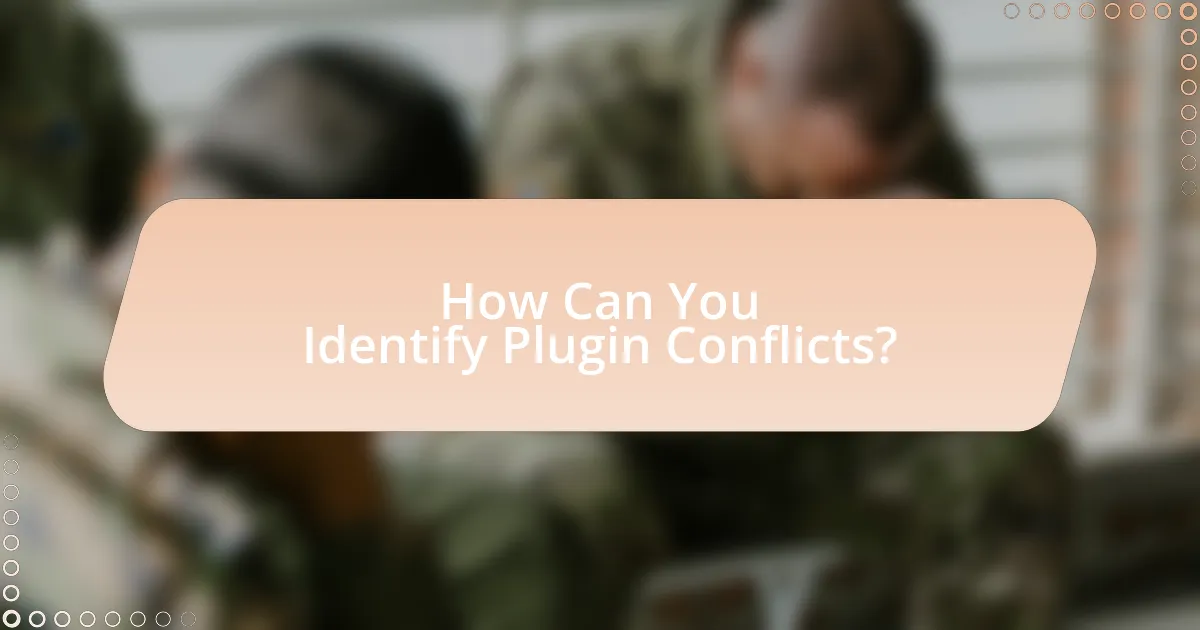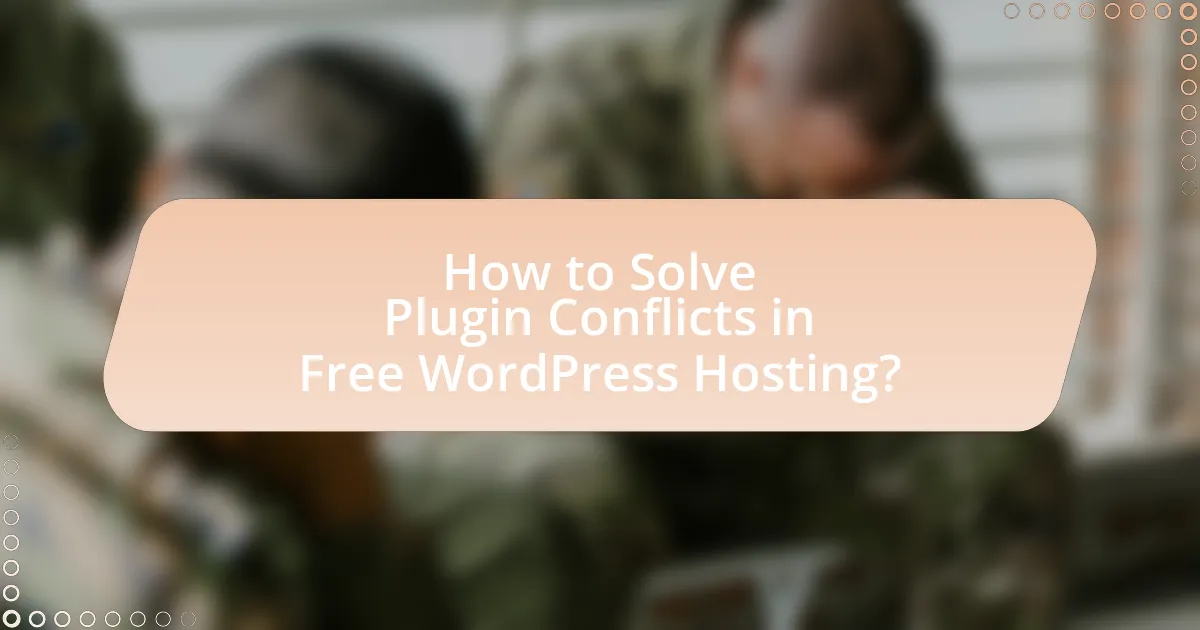Plugin conflicts in free WordPress hosting occur when multiple plugins interfere with each other’s functionality, leading to site errors, slow performance, or broken features. Common causes include incompatible versions, overlapping functionalities, and poor coding practices. Identifying these conflicts typically involves deactivating plugins one by one to pinpoint the source of the issue. The article outlines the signs of plugin conflicts, the importance of resolving them for optimal website performance, and provides systematic troubleshooting steps, including the use of debugging tools and best practices to prevent future conflicts.

What are Plugin Conflicts in Free WordPress Hosting?
Plugin conflicts in free WordPress hosting occur when two or more plugins interfere with each other’s functionality, leading to issues such as site errors, slow performance, or features not working as intended. These conflicts often arise due to overlapping functionalities, incompatible code, or outdated plugins. For instance, if one plugin modifies a core WordPress function that another plugin relies on, it can cause unexpected behavior. Identifying these conflicts typically involves disabling plugins one by one to determine which combination causes the issue, as evidenced by numerous user experiences documented in WordPress support forums.
How do Plugin Conflicts Occur?
Plugin conflicts occur when two or more plugins attempt to modify the same functionality or resource within a WordPress site, leading to errors or unexpected behavior. This can happen due to overlapping code, incompatible versions, or conflicting scripts that interfere with each other’s operations. For instance, if one plugin modifies a specific function and another plugin also tries to alter that same function without proper coordination, it can result in a conflict that disrupts the site’s performance.
What are the common causes of Plugin Conflicts?
Common causes of plugin conflicts include incompatible plugin versions, overlapping functionalities, and poor coding practices. Incompatible plugin versions occur when one plugin relies on a different version of another plugin or the WordPress core, leading to functionality issues. Overlapping functionalities arise when multiple plugins attempt to perform the same task, which can create conflicts in execution. Poor coding practices, such as not following WordPress coding standards, can also lead to errors and conflicts between plugins. These factors contribute to the instability and malfunctioning of a WordPress site when multiple plugins are active.
How do different plugins interact with each other?
Different plugins interact with each other through shared resources, hooks, and APIs within the WordPress ecosystem. When multiple plugins attempt to modify the same functionality or access the same data, conflicts can arise, leading to issues such as site errors or performance degradation. For example, if two plugins try to enqueue the same script or style, it can result in one overriding the other, causing unexpected behavior. Additionally, plugins may use action and filter hooks to modify the output of WordPress, and if they are not properly coded, they can interfere with each other’s operations. This interaction is critical to understand for troubleshooting and resolving plugin conflicts effectively.
Why is it Important to Identify Plugin Conflicts?
Identifying plugin conflicts is crucial because they can lead to website malfunctions, including errors, slow performance, and security vulnerabilities. When multiple plugins interact improperly, they may disrupt the functionality of a WordPress site, causing features to break or behave unexpectedly. According to a study by WP Engine, 70% of WordPress users experience issues related to plugin conflicts, highlighting the prevalence and impact of this problem. By identifying these conflicts early, website owners can ensure optimal performance, maintain security, and enhance user experience.
What impact do Plugin Conflicts have on website performance?
Plugin conflicts negatively impact website performance by causing slow loading times, errors, and even crashes. When multiple plugins attempt to modify the same resources or functionalities, they can create compatibility issues that lead to increased server load and resource consumption. For instance, a study by WP Engine found that poorly coded plugins can slow down a website by up to 50%, significantly affecting user experience and search engine rankings. Additionally, conflicts may result in JavaScript errors, which can disrupt the functionality of other site elements, further degrading performance.
How can Plugin Conflicts affect user experience?
Plugin conflicts can significantly degrade user experience by causing website functionality issues, such as slow loading times, broken features, or complete site crashes. These conflicts often arise when multiple plugins attempt to modify the same functionality or resource, leading to errors that disrupt the intended user interactions. For instance, a study by WP Engine found that 70% of WordPress users experienced performance issues due to plugin conflicts, which directly impacts user satisfaction and retention. Therefore, resolving these conflicts is crucial for maintaining a seamless and efficient user experience on WordPress sites.

How Can You Identify Plugin Conflicts?
To identify plugin conflicts, deactivate all plugins and then reactivate them one by one while checking for issues after each activation. This method allows you to pinpoint which specific plugin causes the conflict by observing changes in website functionality or performance. According to a study by WP Engine, 70% of WordPress users experience plugin conflicts, making systematic testing essential for troubleshooting.
What are the signs of a Plugin Conflict?
Signs of a plugin conflict include website performance issues, such as slow loading times or complete site crashes, and unexpected behavior, like features not functioning as intended. Additionally, error messages may appear, indicating that certain plugins are incompatible with each other. For example, if activating one plugin causes another to malfunction, this is a clear indication of a conflict. Furthermore, changes in the website’s appearance or layout after installing a new plugin can also signal a conflict. These signs are critical for diagnosing and resolving issues in WordPress hosting environments.
How can error messages indicate a Plugin Conflict?
Error messages can indicate a plugin conflict by displaying specific warnings or errors that suggest incompatibility between plugins. For instance, if a user encounters a fatal error message referencing a particular plugin or function that fails to execute, it often points to a conflict with another plugin or the theme. Additionally, error messages such as “Cannot redeclare function” or “Class already exists” typically arise when two plugins attempt to define the same function or class, confirming a conflict. These messages serve as diagnostic tools, helping users identify which plugins may be causing issues, thus facilitating troubleshooting and resolution.
What visual cues should you look for on your website?
Visual cues to look for on your website include inconsistent formatting, broken images, and misaligned elements. These indicators often suggest potential plugin conflicts, which can disrupt the user experience. For instance, if text appears differently across pages or images fail to load, it may signal that a plugin is interfering with the site’s functionality. Additionally, slow loading times and error messages can also serve as visual cues that warrant further investigation into plugin compatibility issues.
What tools can help in identifying Plugin Conflicts?
Tools that can help in identifying plugin conflicts include Query Monitor, Health Check & Troubleshooting, and Debug Bar. Query Monitor provides detailed information about database queries, PHP errors, and hooks, allowing users to pinpoint issues caused by specific plugins. Health Check & Troubleshooting enables users to troubleshoot their site by temporarily disabling all plugins and switching to a default theme, helping to identify conflicts without affecting site visitors. Debug Bar adds a debug menu to the WordPress admin bar, displaying query, cache, and other debugging information, which can assist in diagnosing plugin-related problems. These tools are widely recognized in the WordPress community for their effectiveness in conflict resolution.
How can debugging tools assist in conflict identification?
Debugging tools assist in conflict identification by providing detailed insights into errors and performance issues within WordPress plugins. These tools, such as error logs and debugging plugins, enable developers to trace the source of conflicts by highlighting specific lines of code that generate errors, thus facilitating targeted troubleshooting. For instance, the use of the Query Monitor plugin allows users to monitor database queries, PHP errors, and HTTP requests, which can reveal conflicts between plugins or themes. This capability to pinpoint exact issues enhances the efficiency of conflict resolution, ultimately leading to a more stable WordPress environment.
What role do error logs play in identifying conflicts?
Error logs play a crucial role in identifying conflicts by providing detailed records of system errors and warnings that occur during the operation of plugins. These logs help developers and administrators pinpoint the exact source of conflicts, such as incompatible plugins or coding errors, by documenting the specific conditions under which the errors occurred. For instance, when a plugin fails to execute properly, the error log captures the error message, the file where the error originated, and the line number, enabling targeted troubleshooting. This systematic approach to error tracking is essential for maintaining the stability and functionality of WordPress sites, particularly in environments with multiple plugins, where conflicts are common.

How to Solve Plugin Conflicts in Free WordPress Hosting?
To solve plugin conflicts in free WordPress hosting, first deactivate all plugins to identify the conflicting one. Reactivate each plugin one by one while checking the website’s functionality after each activation. This method allows you to pinpoint which plugin causes the conflict. According to WordPress support documentation, plugin conflicts often arise from incompatible code or overlapping functionalities, making this systematic approach effective for troubleshooting.
What are the steps to troubleshoot Plugin Conflicts?
To troubleshoot plugin conflicts, first deactivate all plugins to identify if the issue persists. Then, reactivate each plugin one by one while checking the website after each activation to pinpoint the conflicting plugin. If the issue reappears after activating a specific plugin, that plugin is likely the source of the conflict. Additionally, ensure that all plugins and WordPress are updated to their latest versions, as outdated software can lead to compatibility issues. Finally, consult the plugin documentation or support forums for known conflicts and solutions. This systematic approach effectively isolates and resolves plugin conflicts in WordPress.
How can you deactivate plugins to isolate the conflict?
To deactivate plugins and isolate the conflict, access the WordPress admin dashboard, navigate to the “Plugins” section, and select “Installed Plugins.” From there, deactivate each plugin one by one by clicking the “Deactivate” link under each plugin name. This method allows you to identify which plugin is causing the conflict by observing the site’s behavior after each deactivation. If the issue resolves after deactivating a specific plugin, that plugin is likely the source of the conflict.
What should you do after identifying the conflicting plugin?
After identifying the conflicting plugin, you should deactivate the plugin to prevent further issues. Deactivating the plugin stops its functionality, which can resolve the conflict immediately. Following this, you can test your website to confirm that the conflict has been resolved. If the site functions correctly without the plugin, you may consider finding an alternative plugin or contacting the plugin developer for support. This approach is effective because it allows you to isolate the problem and maintain website performance.
What best practices can help prevent Plugin Conflicts?
To prevent plugin conflicts, it is essential to regularly update all plugins and the WordPress core. Keeping plugins updated ensures compatibility with the latest version of WordPress and reduces the risk of conflicts. Additionally, using well-coded and reputable plugins minimizes the likelihood of issues arising from poor coding practices. Testing new plugins in a staging environment before deploying them on a live site allows for the identification of potential conflicts without affecting the live site. Furthermore, limiting the number of active plugins can reduce the chances of conflicts, as fewer plugins mean fewer interactions that could lead to issues. Finally, reviewing plugin documentation and user feedback can provide insights into known conflicts and compatibility issues, guiding users in making informed decisions about which plugins to install.
How does regular plugin updates contribute to conflict prevention?
Regular plugin updates contribute to conflict prevention by ensuring compatibility with the latest version of WordPress and other plugins. When plugins are updated, developers often fix bugs, improve performance, and enhance security, which reduces the likelihood of conflicts arising from outdated code. For instance, according to a study by WP Engine, 70% of WordPress vulnerabilities are linked to outdated plugins, highlighting the importance of keeping plugins current to mitigate potential conflicts. Regular updates also allow for better integration with new features introduced in WordPress, further minimizing the risk of incompatibility issues.
What role does plugin compatibility play in avoiding conflicts?
Plugin compatibility is crucial in avoiding conflicts as it ensures that different plugins can work together without causing errors or functionality issues. When plugins are compatible, they share the same coding standards and frameworks, which minimizes the risk of conflicts arising from overlapping functionalities or incompatible code. For instance, according to a study by WP Engine, 70% of WordPress users experience plugin conflicts due to incompatibility, highlighting the importance of selecting plugins that are regularly updated and tested for compatibility with the latest WordPress version. This proactive approach to plugin selection significantly reduces the likelihood of conflicts, ensuring a smoother user experience and maintaining site performance.
What are some common troubleshooting tips for Plugin Conflicts?
To troubleshoot plugin conflicts, first deactivate all plugins and then reactivate them one by one to identify the conflicting plugin. This method allows you to isolate which plugin is causing the issue. Additionally, check for updates for all plugins and the WordPress core, as outdated software can lead to compatibility issues. Reviewing error logs can also provide insights into conflicts, as they often contain specific error messages related to plugin interactions. Lastly, consult the support forums for the specific plugins, as other users may have experienced similar issues and found solutions.
How can you effectively communicate with plugin developers for support?
To effectively communicate with plugin developers for support, clearly articulate your issue by providing specific details about the problem, including error messages, steps to reproduce the issue, and the environment in which it occurs. This approach helps developers understand the context and prioritize your request. For instance, including the version of the plugin, WordPress, and any relevant themes or other plugins can facilitate a quicker resolution. Additionally, using the support forums or direct contact methods provided by the developers ensures that your inquiry reaches the appropriate team, increasing the likelihood of a timely response.
What resources are available for further assistance with Plugin Conflicts?
For further assistance with plugin conflicts, users can access the official WordPress support forums, where community members and experts provide guidance on troubleshooting issues. Additionally, documentation available on the WordPress Codex offers detailed instructions on identifying and resolving plugin conflicts. Online resources such as tutorials and articles from reputable WordPress blogs also serve as valuable references for users seeking solutions to specific plugin-related problems.